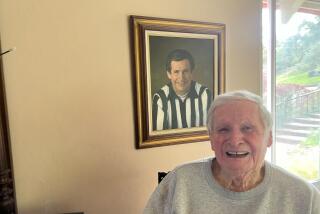Palmer, Rams a Perfect Match
The right place for USC quarterback Carson Palmer in the 2003 season is St. Louis, where Coach Mike Martz knows more about pass offense than any other active coach.
And to acquire the Heisman Trophy winner, Martz ought to trade two first-round draft picks, if necessary, plus one of his two passers, Kurt Warner or Marc Bulger.
Consider:
* This would be a good deal for the Cincinnati Bengals, whoâve got to start winning now, and who could work in an experienced pro faster than any rookie.
* It would also be a good deal for the Rams, who have found that Warner and Bulger have everything but the physical strength and durability for Martzâs challenging system. With Palmer, a tall, sturdy flame-thrower, they would be set at quarterback for 10 years.
* Best of all, it would be a very good deal for Palmer, who will spend the rest of his career one inch away from career-ending, life-threatening injury, and who, if heâs prudent, neednât spend it on a team with demonstrably inferior leaders and athletes.
One of the best quarterbacks to come up since Denverâs John Elway in 1983, Palmer ought to insist on a trade if he has to, as Elway did. Why, Elway asked, do I have to play for any tail-end team? Why should Palmer?
Overtime OK
How much should the NFL do to repair an overtime system that seems to give an edge to coin-toss winners?
Not much, if the goal is simply to break ties, as it should be -- and as it was when the overtime rule was voted in after Pete Rozelle recommended it in 1974.
The idea that each offense should have an equal chance in overtime is âabsurd,â Rozelle, who was then the NFLâs commissioner, noted that year.
Or as Tex Schramm said at the time, speaking as president of the Dallas Cowboys and one of the architects of the new rule:
âIn an NFL game, both sides have a fair and equal chance for 60 minutes -- in each of four quarters -- and thatâs plenty.
âTies, though, are always unsatisfactory. Whatâs needed is a simple way to break ties -- a football way.
âAnd the best football way is to start the game over, toss the coin again, kick off again, and play football again until somebody scores. Then end the game right there. We canât create a perfect world. The point -- after both sides have had a fair chance for 60 minutes -- is to break the tie.â
TV Drives NFL
College footballâs tie-breaking method, which gives each side an opportunity to score, seems unworkable for pro football for two reasons:
* On the smaller NFL rosters of older players, the good pros pace themselves for 60 minutes, after which theyâre all but drained physically and mentally.
* Itâs unrealistic to expect the networks to delay other programs indefinitely for the lengthy overtime periods that can be and often are part of college football. And in the decision-making, TV should be a player because many more sports fans watch NFL games on television rather than in person.
Paul Tagliabue, who succeeded Rozelle as commissioner in 1989, says the league will review its overtime rule again this spring, as it should and as it does periodically. And one change would help -- any change, in fact, that would reduce the power of the soccer kickers who have taken over NFL special-team play since the Schramm era.
There are two possibilities: Overtime kickoffs could be from a point closer to the kicking teamâs end zone. Or field goals could be forbidden until the team on offense drives to a predetermined point closer to the other teamâs end zone.
MVP Mistakes
One other change in NFL procedures appears indicated: The league might strive for a better way to select the Super Bowlâs most valuable player.
At present, football fans have a voice in the process. The problem with that is, many of those tuning in via TV arenât making up their own minds. Many seem to simply heed the words of the game announcers.
For instance, the script of the San Diego Super Bowl telecast reveals that the ABC announcers who worked that game were recommending Tampa free safety Dexter Jackson as early as the first half, after heâd made a couple of interceptions.
Thereafter, Jacksonâs name obviously stuck in the minds of many voting viewers, who chose him for MVP although, to most of those who watched the game in person, the winner should have been one of three defensive linemen, Simeon Rice, Warren Sapp or Greg Spires.
NFL Interceptors
The wrong recipient for any MVP award in any NFL game is any player who happens to intercept a pass or two -- if thatâs his primary qualification for the award.
In pro football, interceptions happen for numerous reasons. Usually itâs a heavy pass rush, as it was in this game. Or the passer might throw inaccurately. Or the intended receiver could make a wrong or unexpected turn. Or the team on offense might be picking on a particular defensive back -- on Jackson, perhaps -- because it doesnât want to attack a better pass defender.
Of all possible reasons for an NFL interception, the least likely, in most games, is the skill of the athlete who makes the interception. Being in the right place at the right time isnât criterion enough.
In general, interceptors are overvalued in pro football because what they do is so easy to see. More often than not, interception statistics border on insignificant. The NFL should strive for more meaningful ways to produce the right MVP than merely listening to a TV announcer.
Walshâs Strategy
The fatal error that cost the Raiders any chance to win the Super Bowl was their decision to use the same plays they called to reach the Super Bowl.
Against Tampa Bay, they sent Jerry Rice and their other receivers out in the same old eight-yard crossing routes and seven-yard-stop patterns theyâd used all season.
The Buccaneers were ready and rehearsed for just what the Raiders showed on running plays as well as passes.
Bill Walsh, the former San Francisco coach who formulated the West Coast offense, did it another way.
During his coaching career, Walsh went to the trouble of completely changing the pass patterns for Rice and his other receivers every week.
One year, when he was developing the West Coast strategy that eventually led to a record five 49er Super Bowl titles in the 1980s, Walsh confided, âNever call any play the other team has seen you use on film.â
As good as his word, Walsh would send Rice to the post from one formation one week, then have him square out a week later. And on passing downs, Walsh was always prepared to run the ball on plays the defense had not seen before.
Like Clark Shaughnessy -- the old coach who first said, âIt doesnât matter what you do, as long as itâs differentâ -- Walsh considers unexpected change-ups to be the heart of any good strategy.
Itâs worth noting that the Raiders, en route to the Super Bowl, beat some very strong opponents with their simple offense -- the NFLâs most effective. But the Tampa defense is something else, and the Raiders performed as if they didnât know that.
More to Read
Go beyond the scoreboard
Get the latest on L.A.'s teams in the daily Sports Report newsletter.
You may occasionally receive promotional content from the Los Angeles Times.






